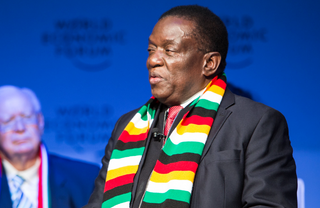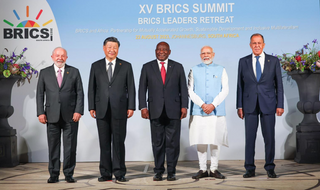News
Warfare State — why Zimbabwe Under Zanu-PF will not Progress
Zanu-PF has pursued politics and economics as war by other means. For Zanu-PF, the cost of crazy economic policies or widespread political repression does not matter so long as it maintains its power and privilege.

Former Minister of Finance, Zimbabwe

Research Director, The Brenthurst Foundation

Director, The Brenthurst Foundation

The Zimbabwe Harmonised Elections, held on 23 August, has come and gone. The reports of the main international observer missions generally agree that the elections were flawed. The SADC Election Observer Mission Statement is particularly damning, pointing out a series of serious problems with the conduct of the election.
In its preliminary report, it stated: “The Mission noted that some aspects of the Harmonised Elections, fell short of the requirements of the Constitution of Zimbabwe, the Electoral Act, and the SADC Principles and Guidelines Governing Democratic Elections (2021).”
These opinions aside, the post-election period is usually a referendum on the legitimacy and credibility of any election.
Zimbabwe has been no exception.
In the aftermath of its election, the Zimbabwean authorities have unleashed force on their opponents, arresting opposition officials and executing a general clampdown across the length and breadth of the country of a sort last seen in the dying days of the Mugabe regime.
In the townships, revellers in bars and other places of entertainment have been attacked by state-linked assailants. Political opponents remain incarcerated, including Job Sikhala, who has now spent a year in remand prison on spurious charges, and Jacob Ngarivhume, who has been sentenced to four years’ imprisonment for merely calling for a peaceful protest.
On the economic front, the Zimbabwean dollar has depreciated by 50%. As a result, there have been increases in the price of groceries, electricity and fuel. School fee increases have left many children unable to attend classes that reopened after the election.
The new Cabinet appointed by President Emmerson Mnangagwa is a ritualised expression of loyalty to nepotism and tribalism. The Cabinet is drawn from members of his family and his immediate allies and is dominated by people from his ethnic region.
The political rhetoric has also escalated, widening even beyond Zimbabwe.
The head of the SADC Election Observer Mission to Zimbabwe, Dr Nevers Mumba, and Zambia’s President Hakainde Hichilema have been subjected to spurious but serious attacks from senior officials of the ruling party.
This is not the behaviour of winners.
Feverish conspiracy theories
The Zimbabwe Broadcast Corporation recently put out a documentary arguing that the main challenge to the ruling Zanu-PF is the result of a vast conspiracy engineered by The Brenthurst Foundation which has reputedly involved the likes of Hichilema and a raft of African opposition leaders in this endeavour.
Included in this vast conspiracy for the first time is the SADC, now painted as a villainous agent of the West because it had the temerity to criticise the election instead of offering up its usual hand-wringing endorsement.
How desperate must the Zimbabwean authorities be?
While such feverish conspiracy theories, which curiously assume that Africans are incapable of leading without external agency, don’t deserve a response, the real problem is the Orwellian description of devastated Zimbabwe as some sort of economic paradise.
The documentary actually claims that Zimbabwe under Mnangagwa has made startling progress.
“For the past five years,” it says, “Zimbabwe has been on a growth trajectory with its economic transformation having progressed astronomically in a short space of time like never experienced since its independence as the second republic under the stewardship of President Emmerson Mnangagwa has led a solid and formidable plan to improve the livelihoods of its nationals.”
How wrong.
The documentary argues that Zimbabwe, if it were not for these externalist conspiracies dragging it down, would be a land of prosperity.
How ahistorical and ludicrous.
The problem with Zimbabwe is not that people outside want to drag it down. It’s that Zanu-PF has been uber-successful in being Zimbabwe’s own worst enemy in this regard.
Under Zanu-PF leadership, Zimbabwe’s per capita income went from $1,739 at independence in 1980, to $1,306 today, a decline of 25%, at a time when global per capita income has gone up by nearly 100%, and even sub-Saharan Africa’s income rose by 8%.
This is despite perhaps as many as five million Zimbabweans, or 30% of the population, having left to live outside, sending back as much as $1-billion annually in remittances, more than a fifth of the government’s annual budget of about $4.5-billion.
Today 6.6 million Zimbabweans, or more than 40% of the population, live in extreme poverty, joblessness is so endemic it is pointless to count, and more than one-quarter of children have stunted growth as a result of a lack of nutrition. These are not the only indicators of decline. The country’s infrastructure is on its knees.
Since independence, while the population has more than doubled from seven million to 16 million, the country has added just 25% in effective electricity output, as many of its roads and nearly all of its railways have deteriorated to the point of dysfunctionality. According to the UN Economic Commission for Europe’s 2022 report, 70% of Zimbabwe’s total road network is in poor to mediocre condition, and just 25% in good to very good condition.
It notes, “The increase of 77% in the number of vehicles from 2010 to 2019 has not been accompanied by any meaningful road upgrade or maintenance of existing road infrastructure since independence in 1980.”
As for the rail network, “Once touted as one of the best rail companies in Africa … NRZ [National Railways of Zimbabwe] has been run down to the extent that the sound of moving trains is a rare phenomenon,” notes Africa Report.
The problem behind all of this is, simply, politics. Attempts to remedy this situation fall foul of Zanu-PF’s serial and brazen defrauding of elections, a fact recognised by most Africans. Only three of 16 SADC African heads of state — South Africa, Congo and the old ally Mozambique — attended Mnangagwa’s inauguration after he supposedly won this August’s election.
Now this is somebody else’s fault. Just like the fiction that sanctions against Zimbabwe are causing poverty, this too is a fiction.
Carl von Clausewitz said that “war is politics by other means”. But Zanu-PF has pursued politics and economics as war by other means. For Zanu-PF, the cost of crazy economic policies or widespread political repression does not matter so long as it maintains its power and privilege. The currency is simply a method to print money, roundtrip and enrich, not a tool of investment or social stability.

A parody of liberation
Zimbabwe’s liberation economy is the very antithesis of a model of national development and empowerment that Zimbabweans, and other southern Africans, crave. It is a parody of liberation. Zimbabweans are today less free and have fewer opportunities than at independence.
Liberation has brought endless misery to the majority and vast riches to a tiny minority.
The challenge facing the Zimbabwe opposition and indeed Zimbabwean citizens is how to confront a belligerent liberation movement bereft of ideas and lacking the skills and legitimacy to turn the economy around.
It is clear that SADC will not act on the report of its Election Observer Mission.
It is also clear that President Cyril Ramaphosa lacks the same appetite that President Thabo Mbeki had to address the Zimbabwean crisis, which resulted in the creation of a Government of National Unity in 2009.
Zimbabwean citizens must therefore accept that SADC can’t outsource or delegate its duty and obligation to confront an authoritarian regime.
In his inauguration speech, Mnangagwa said, “Zimbabwe is surely on the rise. Our national development philosophy, ‘a country is built by its own people’, shall continue to be the beacon of our pro-people policies anchored on pan-African values and norms.
“This philosophy sums up our sovereignty as well as the collective duty and obligation we have to develop the country and the African continent,” he said.
But for the region, the question is also simple: Why support the Zanu-PF regime in Zimbabwe? Is it not dragging down the perception of the region as an investment destination?
It makes a mockery of any call for closer regional integration, as Zanu-PF’s brand of economic warfare demands instead insulation of its worst effects.
The only answer can be that the liberation movements either admire Zimbabwe’s revolutionary rhetoric or that they fear the rise of liberal opposition. That should make all those who believe in democracy as a tool of governance and of change double down on their efforts.
Zanu-PF’s record is a case study on how to ruin a country.
The fundamental problem is thus: Unless Zanu-PF — like any other government in the region — can recognise and admit the error of its ways, and acts on this knowledge, its continued rule only promises much the same, no matter what its propagandists say, at home and abroad.
This article originally appeared on the Daily Maverick
Photo: World Economic Forum

